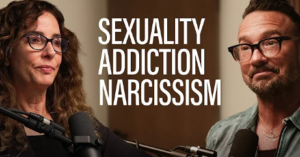Sex Addiction FAQ
Sexual addiction has also been called sexual dependency, sexual compulsivity and hypersexual disorder. By any name, it is a compulsive behavior that completely dominates the addict’s life. Sexual addicts make sex a priority more important than family, friends, and work. Sex becomes the central role of an addict’s life. They are willing to sacrifice what they cherish most in order to preserve and continue their unhealthy behavior. People act out their addiction in a wide variety of ways, including strip clubs, masturbation, hiring prostitutes, watching porn, and random sex partners.
Take the Sex Addiction Screening Test or Love Addiction Screening Test. Ask yourself, “Am I repeatedly engaging in sexual behaviors that I cannot stop even though I want to stop, that leave me feeling shame and guilt, that involve living a double life with secrets and lies, that may lead to negative consequences?” If yes, and you cannot stop, there is a strong chance that you are addicted.
There are several reasons, such as negative early sexual experiences, history of trauma/anxiety/depression that leads a person to want to get high or escape the doldrums of everyday life through sexual acting out or obsessive fantasy. People who are either ADD or obsessive-compulsive are drawn to sexual addiction too.
Many sex addicts first get into treatment after being discovered for an act of infidelity in a committed relationship. Not everyone who cheats on a partner is a sex addict; although an exposed affair meets several of the criteria for diagnosis as it involves secrets, lies, and negative consequences. Good psychotherapy can uncover whether infidelity is the result of a recurring pattern of sex addiction, which can involve obsessive sexual thoughts and/or behaviors, or whether infidelity is a result of a lack of emotional intimacy.
It’s hard to imagine that anyone would want to identify as a sex addict as an excuse. Treatment requires a rigorous commitment. There are differences between excusing and enabling bad behavior. Today, biological conditions have been discovered that are effective explanations for various behaviors that were considered unforgivable character flaws in the past — such is the case for many mental illnesses and diagnoses. The bad excuse lies not in the initial diagnosis of sex addiction, but for failing to follow through with proper treatment.
There are hormonal drugs that may reduce or increase sexual drive, but we believe healthy sexuality is the result of a combination of emotional security and psychological wholeness that cannot simply be medicated into being. For some clients, we may recommend consulting with a psychiatrist. Treating some psychological issues with medication often allows access to underlying emotional issues, which is essential to make lasting change.
Abstinence may be required for a certain amount of time depending on the circumstances. The goal of treatment is not to repress sexuality, but to develop the capacity for healthy sexuality. Each person works with his or her therapist to identify which behaviors are a problem and these behaviors need to stop for a consistent period of time to help a person go through withdrawal and re-set their brains, bodies and personalities to living without the drug-like high of sex addiction.
A common mistake occurs when people expect any therapist untrained in sex addiction therapy to be able to treat sex addiction. The clinical staff at Center for Healthy Sex are trained therapists with graduate-level degrees in psychotherapy that have chosen to specialize in sex addiction therapy, which requires further education and fieldwork. In fact, many of our clients have been referred to us by a primary therapist, just as in the medical field when a general practitioner refers patients to a specialist. In such cases, our clinical team works closely with the primary therapist to coordinate a successful treatment plan for clients.
When sexual addiction is referred to as an intimacy disorder, this means that a sex addict’s psychological pattern for healthy intimacy is disordered. “Intimacy” corresponds to the verb “to intimate,” which means to make known. Intimate knowledge in any relationship requires two key aspects: to be able to know oneself, and to be able to freely share and receive this knowledge. All human beings share a basic need to connect through intimacy. This ability to connect can become disordered through trauma, but usually for most addicts this ability was disordered in early childhood. If childhood attempts to connect with healthy intimacy were prevented or impossible, the resulting isolation develops an ever-increasing need for alternative methods of self-soothing. In adulthood, sex addiction is one such method of self-medication. A frustrated inability to dependably connect with healthy intimacy in primary relationships drives the sex addict to connect in unhealthy ways that further reinforce the basic inability to connect. This kind of irrationality underlies the tragedy of untreated sex addiction.
Many clients confirm after treatment that what they previously considered to qualify as “great sex,” today would no longer satisfy them and was never truly satisfying. To overcome sex addiction results in a better self-image and self-acceptance, and a healthy sex life that does not include secrets, lies, shame, regrets, trauma, or pain for anyone involved. The therapist relationship teaches the client that it’s possible for another to honor and receive his or her most authentic reality. More importantly, the client learns to honor and receive his or her own reality, which results in integrity. Sexuality based on integrity and trust opens the door for a greater experience of sex. Healthy sex is consensual sex between adults and yields pleasure and personal growth.
- Through individual therapy, group therapy, or an outpatient intensive, you will be able to speak openly about your fears and sexual issues, in a safe therapeutic relationship with clear boundaries. During your time of self discovery, you can dig deeply into your problems to understand the origin of them and what has to be done in order to change. Call Center for Healthy Sex at 310.843.9902.




